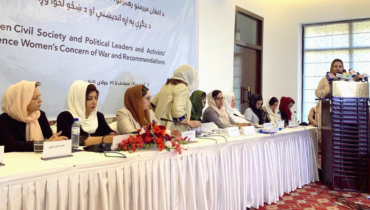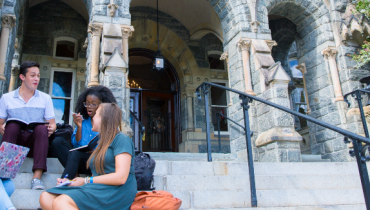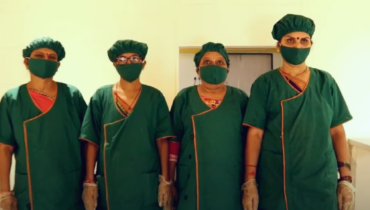Obiageli Ezekwesili created the #BringBackOurGirls campaign in response to the abduction of nearly 300 schoolgirls in northeastern Nigeria by Boko Haram in April 2014. Mayesha Alam, Associate Director of the Georgetown Institute for Women, Peace & Security, interviewed her about the plight of the Chibok girls and the campaign to bring them back.
Mayesha Alam: Let’s start with the beginnings of the #BringBackOurGirls campaign – what was your motivation and your strategy?
The abduction of our Chibok girls happened at midnight of April 14th, 2014. Earlier that day, there had been a suicide bomb explosion in the outskirts of Abuja – the federal capital territory. And people were dying! So I thought, what’s going on here? We, as citizens, can’t simply be lost in our own world and say this hasn’t touched us or it doesn’t matter. It does matter. Citizens are dying, no one is accounting for the deaths and there doesn’t seem to be an effective response.
So I put out a tweet that called on everyone to offer an idea of what our government could do to address this scourge of terrorism. I asked people to tweet a solution at me and use the hashtag #CitizenSolutionToEndTerrorism. By the evening of that day, we had close to 700 tweets and I was thinking, ‘What am I going to do with all these ideas?’
“We were becoming so used to the morbidity around us. So when the abduction of those girls happened, I was determined not to allow my society to move on.”
So one of the young people that followed me on Twitter tweeted and said, “Auntie Oby asked all of us to say #BringBackOurDaughters, #BringBackOurGirls.” And I retweeted that and did my own tweets calling everyone to join us in demanding the rescue of our Chibok girls, to keep tweeting #BringBackOurGirls. And it gained traction. By that time, I had a strategy. There were young people with a voice wanting to be heard. So I reached out to them to be the curators of everything that’s been sent, and let it be something with which to engage our government and to say we want a place at the table to tackle this problem.
We were becoming so used to the morbidity around us. So when the abduction of those girls happened, I was determined not to allow my society to move on. I said that I would get to the root of this and there would be my voice out there for the girls. So from April 15th, I started tweeting at everybody and anybody, tweeting at all our media outlets, but everyone was silent! With my Twitter handle, I didn’t need the domestic media in order for my voice to be out there. Because my voice is recognized in the society, lots of people joined. So from April 15th up until today, I have not stopped tweeting concerning our Chibok girls.
“With my Twitter handle, I didn’t need the domestic media in order for my voice to be out there.”
Mayesha Alam: Why do you think Boko Haram targeted these girls? And what is it about a girl with a book that is so threatening to a group such as Boko Haram?
Their basic philosophy goes against knowledge and education. So whether you are a boy or you are a girl, they’re saying education is haram– an abomination. They also have absolutely no respect for women; it is consistent with their ideology to take women and deprive them of their right to education, and to use them as weapons of war. Their violence against women is expressed in achieving that dual purpose of subjugating the women and making it impossible for them get any knowledge or education. The kind of extremism that the abduction of our girls symbolizes is the type that we don’t want to allow to fester in the world. We, as a modern civilization, must stand against such cruelty. Because, the truth is, we will lose our moral credential to tell any girl child to go to school.
How can you tell a girl child to go to school in troubled spots of the world when they will say, “Some girls listened to you and went to school in Borno State, and they never came back?” Are you going to say to girls “We’ve got your back”? No! You can’t. They’re going to say that 219 girls in Nigeria went to school, they were taken by savages, the world moved on, and you’re telling me to go there and get an education?
What the world unwittingly has done by not rescuing our Chibok girls for over a year now is that it has said to every girl child in very troubled environments: ‘You have to make a choice to either be educated or lose your life.’ How can that possibly be a choice? How can we, as women in the world that got this far through education, watch such a choice be something presented to young women? It shouldn’t happen. I will not be part of the society where it happens.
If I were not educated, I would not achieve even a percentage of all that I have achieved in life. Education has brought me this far. And then the same education will become an abomination? No! I will resist it with everything I’ve got. I will keep hoping until there is no more reason to hope. And I will keep calling for action for their rescue until there is no more reason to call for action.
“What the world unwittingly has done by not rescuing our Chibok girls for over a year now is that it has said to every girl child in very troubled environments: ‘You have to make a choice to either be educated or lose your life.’ How can that possibly be a choice?”
Mayesha Alam: What do you think needs to be done?
The world has all the modern technology. The world has all the resources. What kind of a world goes on a break when the most important issues of humanity are on trial? We need the kind of human and military intelligence that would enable us know where at least two—three—four—five—six—ten—fifty of these girls are! You’re saying to me that it has eluded the world? To lead to their rescue, the governments of this world need to bring their resources together.
President-elect Buhari has already made a promise that this is a priority for him. Our constitution says that the primary responsibility of government is the security and welfare of citizens. That’s why we hold the federal government accountable for these girls. They failed in securing them; it is time to rescue them. We’re going to hold them to it.
Mayesha Alam: As these girls are being rescued—or escaping—what do they need?
Rehabilitation, resettlement and reintegration. When we have a clear agreement as to what needs to be done, we’re going to need partners from around the world to really support it massively. At the appropriate time, we’re going to need the whole world that joined us in demanding their rescue to also support the multifaceted resources that are required. Whether it is knowledge, services, financial resources, human resources or psychosocial care, we need people from around the world to come and show that we really are here with the girls, we’re going to hold their hands and we welcome them back into society. The human spirit is so undying when it is determined. The story of our Chibok girls is not yet over.
We need a collaborative disruption of the present acceptance of extremism, especially targeting women. The ones who are against our civilization are acting more strategically than the rest of the world. Our common enemy is the one that has decided to wage a war against women, whether it is what violent extremists are doing to our Chibok girls, or what they are doing to women and girls in Syria, Pakistan, or even North Korea. Wherever women are being attacked by extremist ideas, it is the same underlying philosophy and the world cannot afford to stay in this state of complacency.
“The human spirit is so undying when it is determined. The story of our Chibok girls is not yet over.”
This interview was possible as part of a collaboration between the Georgetown Institute for Women, Peace and Security and Women in the World.


